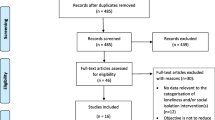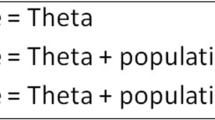Abstract
The World Health Organization Disability Assessment Schedule (WHODAS 2.0) is the official generic assessment instrument of WHO for disability and health. It is considered to be applicable across cultures in adult populations. The paper describes the development, cultural adaptation and validation of the Greek version of the official WHODAS 2.0, 36-item assessment schedule. The research tested the psychometric properties of this version in order to identify if it can be considered a valid and reliable instrument for measuring health and disability in the Greek population and culture. Field test studies were conducted in two hundred participants of the general population, aged over 61 years old, in a Greek Open Care Centre for the elderly. The study was carried out between July 2015 and September 2016. The linguistic adaptation of the original instrument was performed according to the most recent guidelines. Ratings of the different items were statistically analyzed to investigate the construct, criterion and concurrent validity and reliability of the instrument. Construct validity is confirmed in the Greek version of WHODAS 2.0. Concurrent validity is well established between the scores of WHODAS 2.0 and SF-36 v2. Cronbach’s α (0.673–0.901) and ICC (0.793–0.885) values indicate satisfactory reliability. The study supports the validity and reliability of the official Greek version of WHODAS 2.0, which can be used to assess effectively the quality of life and disability levels of the intended population and inform policy-making. Findings will be further tested in larger and diversified samples in subsequent parts of the study.

Similar content being viewed by others
References
Baron, M., Schieir, O., Hudson, M., Steele, R., Kolahi, S., Berkson, L., Couture, F., Fitzcharles, M., Gagné, M., Garfield, B., Gutkowski, A., Kang, H., Kapusta, M., Ligier, S., Mathieu, J., Ménard, H., Starr, M., Stein, M., Zummer, M.: The clinimetric properties of the world health organization disability assessment schedule II in early inflammatory arthritis. Arthritis Rheum. 59(3), 382–390 (2008)
Beaton, D., Bombardier, C., Guillemin, F., Ferraz, M.: Guidelines for the process of cross-cultural adaptation of self-report measures. Spine 25(24), 3186–3191 (2000)
Beaton, D., Bombardier, C., Guillemin, F., Ferraz, M.: Recommendations for the Cross-Cultural Adaptation of Health Status Measures. American Academy of Orthopaedic Surgeons, New York (2002)
Chatterji, S., Byles, J., Cutler, D., Seeman, T., Verdes, E.: Health, functioning, and disability in older adults–present status and future implications. Lancet 385(9967), 563–575 (2015). https://doi.org/10.1016/S0140-6736(14)61462-8
Chisolm, T.: The WHO-DAS II: psychometric properties in the measurement of functional health status in adults with acquired hearing loss. Trends Amplif. 9(3), 111–126 (2005)
Chiu, T., Yen, C., Chou, C., Lin, J., Hwang, A., Liao, H., Chi, W.: Development of traditional Chinese version of World Health Organization Disability Assessment Schedule 2.0 36–item (WHODAS 2.0) in Taiwan: validity and reliability analyses. Res. Dev. Disabil. 35(11), 2812–2820 (2014)
Chwastiak, L., Von Korff, M.: Disability in depression and back pain: evaluation of the World Health Organization Disability Assessment Schedule (WHO DAS II) in a primary care setting. J. Clin. Epidemiol. 56(6), 507–514 (2003)
Family.jrank.org: Disabilities—Impact of Disabilities on Families. http://family.jrank.org/pages/396/Disabilities-Impact-Disabilities-on-Families.html (2017). Accessed 9 Oct 2017
Garin, O., Ayuso-Mateos, J., Almansa, J., Nieto, M., Chatterji, S., Vilagut, G., Alonso, J., Cieza, A., Svetskova, O., Burger, H., Racca, V., Francescutti, C., Vieta, E., Kostanjsek, N., Raggi, A., Leonardi, M., Ferrer, M.: Validation of the “World Health Organization Disability Assessment Schedule, WHODAS-2” in patients with chronic diseases. Health Qual. Life Outcomes. 8(1), 51 (2010)
Guernsey, K., Nicoli, M., Ninio, A.: Convention on the Rights of Persons with Disabilities: Its Implementation and Relevance for the World Bank. The World Bank (2007)
Guilera, G., Gómez-Benito, J., Pino, O., Rojo, J., Cuesta, M., Martínez-Arán, A., Safont, G., Tabarés-Seisdedos, R., Vieta, E., Bernardo, M., Crespo-Facorro, B., Franco, M., Rejas, J.: Utility of the World Health Organization Disability Assessment Schedule II in schizophrenia. Schizophr. Res. 138(2–3), 240–247 (2012)
Guillemin, F., Bombardier, C., Beaton, D.: Cross-cultural adaptation of health-related quality of life measures: literature review and proposed guidelines. J. Clin. Epidemiol. 46(12), 1417–1432 (1993)
Hudson, M., Steele, R., Taillefer, S., Baron, M.: Quality of life in systemic sclerosis: psychometric properties of the World Health Organization Disability Assessment Schedule II. Arthritis Rheum. 59(2), 270–278 (2008)
Ingstad, B., Whyte, S.: Disability and Culture. University of California Press, Berkeley (1995)
Klein, P.: The Handbook of Psychological Testing. Routledge, London (1993)
Koumpouros, Y., Sakellari, E., Papageorgiou, E., Lagiou, A.: Measuring health and disability. Manual for WHO Disability Assessment Schedule, WHODAS 2.0. WHO, Athens (2017)
Maruish, M.E.: User’s Manual for the SF-36v2 Health Survey, 3rd edn. QualityMetric Incorporated, Lincoln (2011)
McHorney, C., Ware, J., Raczek, A.: The MOS 36-Item Short-Form Health Survey (SF-36): II. Psychometric and clinical tests of validity in measuring physical and mental health constructs. Med. Care 31(3), 247–263 (1993)
McKibbin, C., Patterson, T., Jeste, D.: Assessing disability in older patients with schizophrenia. J. Nerv. Ment. Dis. 192(6), 405–413 (2004)
Mont, D.: Measuring health and disability. The Lancet 369(9573), 1658–1663 (2007)
National Institute on Ageing and World Health Organization: Global Health and Aging. National Institute on Aging, National Institutes of Health, Washington, DC. NIH Publication no. 11-7737 (2011)
Nunally, J., Berstein, I.: Psychometric Theory, 3rd edn. McGraw-Hill, New York (1994)
Pösl, M., Cieza, A., Stucki, G.: Psychometric properties of the WHODASII in rehabilitation patients. Qual. Life Res. 16(9), 1521–1531 (2007)
Schlote, A., Richter, M., Wunderlich, M., Poppendick, U., Möller, C., Wallesch, C.: Use of the WHODAS II with stroke patients and their relatives: reliability and inter-rater-reliability. Die Rehabil. 47(1), 31–38 (2008)
Silva, C., Coleta, I., Silva, A., Amaro, A., Alvarelhão, J., Queirós, A., Rocha, N.: Adaptation and validation of WHODAS 2.0 in patients with musculoskeletal pain. Revista de Saúde Pública 47(4), 1–6 (2013)
Ulug, B., Ertugrul, A., Ggüs, A., Kabakçi, E.: Reliability and validity of the Turkish version of the World Health Organization Disability Assessment Schedule-II (WHO-DAS-II) in schizophrenia. Turk. Psikiyatr. Derg. 12(2), 121–130 (2001)
Vallerand, R.: Toward a methodology for the transcultural validation of psychological questionnaires: implications for research in the French language. Can. Psychol. 30, 662–680 (1989)
Ware, J., Kosinski, M., Bayliss, M., McHorney, C., Rogers, W., Raczek, A.: Comparison of methods for the scoring and statistical analysis of SF-36 health profile and summary measures: summary of results from the Medical Outcomes Study. Med Care 33, AS264–AS279 (1995)
Who.int. WHO: Process of translation and adaptation of instruments. http://www.who.int/substance_abuse/research_tools/translation/en. Accessed 25 Mar 2017
Wolf, A., Tate, R., Lannin, N., Middleton, J., Lane-Brown, A., Cameron, I.: The World Health Organization Disability Assessment Scale, WHODAS II: reliability and validity in the measurement of activity and participation in a spinal cord injury population. J. Rehabil. Med. 44(9), 747–755 (2012)
World Health Organization: Disability Prevention and Rehabilitation: Report of the WHO Expert Committee on Disability Prevention and Rehabilitation. Technical report series 668. WHO, Geneva (1981)
World Health Organization: International Classification of Functioning, Disability and Health: ICF. WHO Library Cataloguing, Geneva (2001)
World Health Organisation: In: Ustün, T.B., Kostanjsek, N., Chatterji, S., Rehm, J. (eds.) Measuring Health and Disability: Manual for WHO Disability Assessment Schedule (WHODAS 2.0). WHO, Malta (2010)
World Health Organization: How to Use the ICF: A Practical Manual for Using the International Classification of Functioning, Disability and Health (ICF). Exposure Draft for Comment. WHO, Geneva (2013)
World Health Organisation: World Report on Ageing and Health. WHO, Geneva (2015)
World Health Organization, The World Bank: World Report on Disability. WHO, Geneva (2011)
Author information
Authors and Affiliations
Corresponding author
Ethics declarations
Conflict of interest
The authors declare that they have no conflict of interest.
Ethical approval
All procedures performed in studies involving human participants were in accordance with the ethical standards of the institutional and/or national research committee and with the 1964 Helsinki declaration and its later amendments or comparable ethical standards.
Informed consent
Informed consent was obtained from all individual participants included in the study.
Rights and permissions
About this article
Cite this article
Koumpouros, Y., Papageorgiou, E., Sakellari, E. et al. Adaptation and psychometric properties evaluation of the Greek version of WHODAS 2.0. pilot application in Greek elderly population. Health Serv Outcomes Res Method 18, 63–74 (2018). https://doi.org/10.1007/s10742-017-0176-x
Received:
Revised:
Accepted:
Published:
Issue Date:
DOI: https://doi.org/10.1007/s10742-017-0176-x




